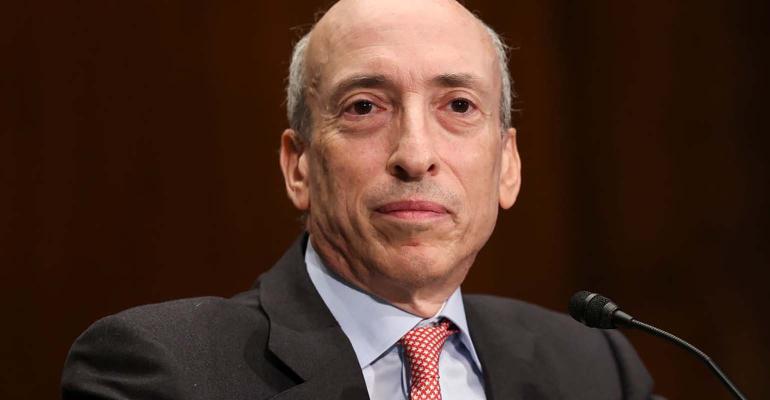(Bloomberg Opinion) -- Securities and Exchange Commission Chair Gary Gensler has embarked on an ambitious reform of stock trading. It’s almost certain to put his agency at odds with market participants, potentially including retail traders. What benefit it will have is anybody’s guess.
Gensler is concerned about what he sees as an unfairly fragmented market. The trades of most individual retail investors never reach a public exchange. Instead, brokers such as Robinhood Markets Inc. typically route them directly to wholesalers (also known as high-frequency traders) who like to take the orders because they’re small and random, and hence relatively unlikely to incur losses. In return, the wholesalers provide better prices and even pay brokers for the business — a practice known as “payment for order flow,” which has enabled the era of commission-free trading.
Although great for active retail traders and the meme-stock crowd, this arrangement isn’t ideal for pension funds, mutual funds and other institutions that invest on behalf of millions of regular folks. They’re largely left to trade with one another on “lit” markets, where prices aren’t as advantageous, partly due to the dearth of retail activity. The differences, though, are very small — on the order of hundredths of a percentage point — and hence not particularly significant for long-term, buy-and-hold investors.
Nonetheless, the SEC is proposing a whole suite of reforms aimed at reuniting the market. Most important, it will send many retail orders to auctions, where more participants will have the opportunity to interact with them. Beyond that, it will allow public exchanges to use the same sub-penny price increments that wholesalers do, and it will strengthen rules requiring brokers to seek the most favorable terms for their customers. Not surprisingly, many financial firms — notably Robinhood and big wholesalers such as Citadel Securities and Virtu Financial Inc. — have been opposed and are inclined to fight.
Whether these changes — which are being called the most sweeping in more than a decade — ultimately benefit anyone will depend a lot on the details, the execution and market participants’ response. They might merely transfer costs from institutions to retail traders and reshuffle profits among wholesalers and exchanges. They could give more power to public exchanges, which have problems of their own that the SEC will also need to mitigate. Research suggests that order-by-order auctions haven’t worked very well in options markets, and might not achieve the desired result in the stock market, either.
What’s certain is that the reforms will require a lot of SEC resources, and a lot of political will, to get to the finish line and be put into practice. Weighing the costs against the uncertain benefits, one struggles to see how it’s worth it.
More From Bloomberg Opinion:
- The SEC Wants More Stock Auctions: Matt Levine’s Money Stuff
- What Did SBF and FTX Lose in Real Money?: Paul Davies
- FTX Lesson No. 1 Is to Not Sleep in Accounting Class: Michelle Hanlon and Nemit Shroff
Want more Bloomberg Opinion? OPIN <GO>. Or subscribe to our daily newsletter.
—Editors: Mark Whitehouse, Timothy Lavin.
To contact the senior editor responsible for Bloomberg Opinion’s editorials: Timothy L. O'Brien at [email protected]





